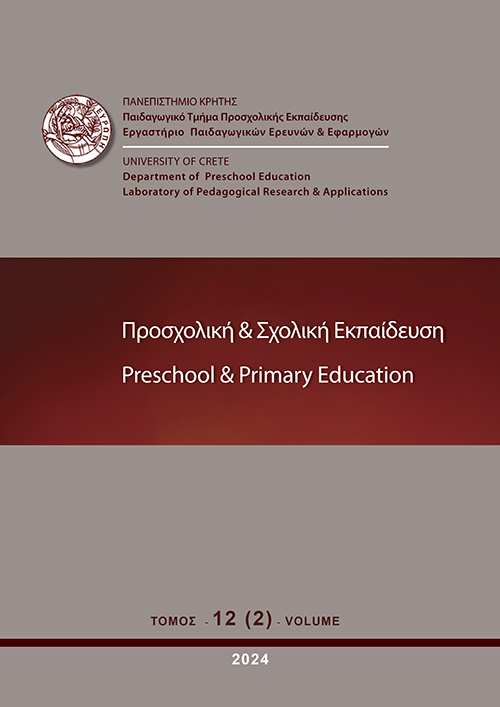Exploring the relationship between young children’s self-concept and prosocial behaviour in the Greek Ear-ly Childhood Education and Care setting: A study on soft skills assessment

Περίληψη
Ο σκοπός αυτής της εργασίας ήταν να διερευνήσει τις απόψεις των μικρών παιδιών για την αυτοαντίληψη τους και να εξετάσει την σχέση της με την προ-κοινωνική συμπεριφορά τους. Διερευνήθηκαν επίσης οι ψυχομετρικές ιδιότητες της κλίμακας "Adaptive Social Behavior Inventory (ASBI) " στο ελληνικό πλαίσιο της προσχολικής εκπαίδευσης. Η μελέτη στηρίζεται στην Κοινωνικό-συναισθηματική προσέγγιση που υπογραμμίζει τη σημασία της ανάπτυξης των διαπροσωπικών δεξιοτήτων στα πρώτα χρόνια. Το δείγμα περιελάμβανε 102 μικρά παιδιά (Μ.Τ. = 3.79, Τ.Α. = .20) και τους εκπαιδευτικούς τους από εννέα προσχολικά κέντρα. Τα εργαλεία που χρησιμοποιήθηκαν ήταν οι κλίμακες "Adaptive Social Behavior Inventory (ASBI)" και "Pictorial Scale of Perceived Competence and Social Acceptance (PSPCSA)". Τα αποτελέσματα από την παραγοντική ανάλυση υποστήριξαν τη δομή τεσσάρων παραγόντων της κλίμακας ASBI και την υψηλή αξιοπιστία της: προκοινωνική συμπεριφορά, συνεργασία/συμμόρφωση, αντικοινωνική συμπεριφορά και εμπιστοσύνη. Τα ευρήματα έδειξαν ότι οι πεποιθήσεις της αυτο-αντίληψης των μικρών παιδιών συνδέονται θετικά με την προκοινωνική συμπεριφορά των παιδιών. Συλλογικά, τα ευρήματα υπογραμμίζουν τη σημασία της υποστήριξης των πεποιθήσεων της αυτοαντίληψης των μικρών παιδιών και τον αντίκτυπό στη συμπεριφορά τους.
Λεπτομέρειες άρθρου
- Πώς να δημιουργήσετε Αναφορές
-
Vatou, A., Vatou, A., & Tsitiridou-Evangelou, M. (2024). Exploring the relationship between young children’s self-concept and prosocial behaviour in the Greek Ear-ly Childhood Education and Care setting: A study on soft skills assessment. Preschool and Primary Education, 12(2), 133–148. https://doi.org/10.12681/ppej.37269
- Ενότητα
- Άρθρα

Αυτή η εργασία είναι αδειοδοτημένη υπό το CC Αναφορά Δημιουργού – Μη Εμπορική Χρήση – Παρόμοια Διανομή 4.0.
Οι συγγραφείς των άρθρων που δημοσιεύονται στο ΠΡΟΣΧΟΛΙΚΗ & ΣΧΟΛΙΚΗ ΕΚΠΑΙΔΕΥΣΗ διατηρούν τα δικαιώματα πνευματικής ιδιοκτησίας επί των άρθρων τους, δίνοντας στο περιοδικό το δικαίωμα της πρώτης δημοσίευσης. Άρθρα που δημοσιεύονται στο ΠΡΟΣΧΟΛΙΚΗ & ΣΧΟΛΙΚΗ ΕΚΠΑΙΔΕΥΣΗ διατίθενται με άδεια Creative Commons 3.0 και σύμφωνα με την άδεια μπορούν να χρησιμοποιούνται ελεύθερα, με αναφορά στο/στη συγγραφέα και στην πρώτη δημοσίευση για μη κερδοσκοπικούς σκοπούς και με δικαίωμα τροποποίησης μόνον με παρόμοια διανομή (αν αναμείξετε, τροποποιήσετε, ή δημιουργήσετε πάνω στο υλικό, πρέπει να διανείμετε τις δικές σας συνεισφορές υπό την ίδια άδεια όπως και το πρωτότυπο). To Εργαστήριο Παιδαγωγικών Ερευνών και Εφαρμογών του Παιδαγωγικού Τμήματος Προσχολικής Εκπαίδευσης του Πανεπιστημίου Κρήτης και το Εθνικό Κέντρο Τεκμηρίωσης διατηρούν το δικαίωμα να δημοσιεύουν, να αναπαραγάγουν, να παρουσιάζουν στο κοινό, να διανέμουν και χρησιμοποιούν άρθρα που δημοσιεύονται στο ΠΡΟΣΧΟΛΙΚΗ & ΣΧΟΛΙΚΗ ΕΚΠΑΙΔΕΥΣΗ σε οποιοδήποτε μέσο και μορφή είτε μεμονωμένα είτε ως μέρη συλλογικών έργων, για όλο το χρόνο διάρκειας προστασίας της πνευματικής ιδιοκτησίας και για όλες τις χώρες του κόσμου. Αυτό περιλαμβάνει ενδεικτικά και όχι αποκλειστικά, το δικαίωμα δημοσίευσης των άρθρων σε τεύχη του περιοδικού ΠΡΟΣΧΟΛΙΚΗ & ΣΧΟΛΙΚΗ ΕΚΠΑΙΔΕΥΣΗ, αναπαραγωγής και διανομής μεμονωμένων αντιγράφων των άρθρων, αναπαραγωγής ολόκληρων των άρθρων σε άλλη έκδοση του Εργαστηρίου Παιδαγωγικών Ερευνών και Εφαρμογών του Παιδαγωγικού Τμήματος Προσχολικής Εκπαίδευσης του Πανεπιστημίου Κρήτης και του Εθνικού Κέντρου Τεκμηρίωσης και αναπαραγωγής και διανομής των άρθρων ή περίληψης αυτών με χρήση πληροφορικού συστήματος αποθετηρίου.


